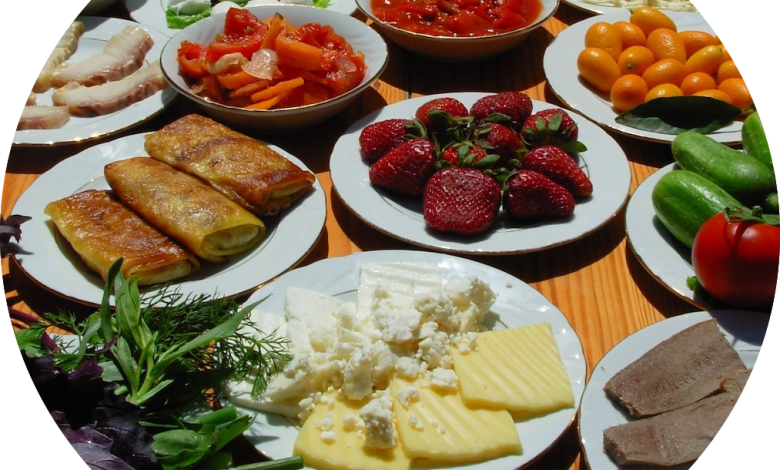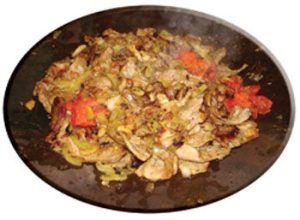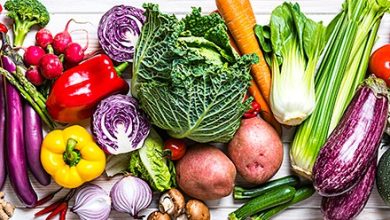What is the national cuisine of Azerbaijan? Why is Azerbaijan food famous?
the national cuisine of Azerbaijan

the national cuisine of Azerbaijan:
The location, climate, and multicultural background of the nation have all had an impact on the rich and varied national cuisine of Azerbaijan. The cuisine of Azerbaijan is renowned for its flavorful spices, selection of fresh and dried fruits, range of meats, and traditional bread.
The following are some essential ingredients and meals that make up Azerbaijan’s national cuisine:
- Plov (Pilaf): The national meal of Azerbaijan is called plov, and it is created with rice, saffron, a variety of meats (usually lamb, beef, or chicken), and vegetables. It is a standard meal that is frequently served at gatherings and on special occasions.
- Dolma: Dolma is made of grape leaves that have been mixed with rice, minced meat (usually lamb or beef), and a variety of spices. Other ingredients for stuffing include cabbage leaves and vegetables like peppers and eggplants.
- Kebabs: In Azerbaijani cuisine, kebabs are a common choice, particularly those made using skewered and grilled meats. For a tasty and tender end product, various meats, including lamb, beef, and chicken, are marinated and grilled over an open flame.
- Lavash: Lavash is a common ingredient in Azerbaijani cuisine because it is soft, thin, and unleavened. It is frequently used to serve alongside various foods, wrap kebabs, or scoop up stews.
- Dushbara: Dushbara are little meat-filled dumplings that are frequently served in a transparent broth. In Azerbaijan, they are a cherished comfort dish.
- Shah Pilaf: The ingredients for Shah Pilaf include rice, saffron, meat (usually lamb), dried fruit, and almonds. It is regarded as a celebratory dish and is eaten on significant holidays.
- Qutab: Qutab is a thin pastry that resembles a pancake and is stuffed with ground meat, herbs, and spices. It may also have contents like cheese, pumpkin, or vegetables.
- Azerbaijani Sweets: Baklava, Shekerbura (a sweet pastry packed with almonds and sugar), Pakhlava, and Gogal are just a few of the classic sweets and desserts available in Azerbaijani cuisine.
- Azerbaijani Tea: The beverage of choice in Azerbaijan is tea, which is frequently served in the nation’s distinctive armudu (pear-shaped) glasses with sugar cubes or preserves. The people of Azerbaijan are proud of their hospitality and tea culture.
- Dovga: A yogurt-based soup called dovga is prepared with a variety of herbs, greens, and grains like rice or wheat. It is frequently savored throughout the spring and summer.
The use of fragrant spices, rich tastes, and fresh, in-season ingredients are hallmarks of Azerbaijani cuisine. The diversity and wealth of Azerbaijan’s cultures are reflected in its cuisine.

Why is Azerbaijan food famous?
For a number of reasons, including those listed below, Azerbaijani cuisine is known and beloved:
- Unique and Flavorful Dishes: Azerbaijani food provides a broad variety of distinctive and savory meals made using a variety of fresh herbs, spices, and other ingredients. Azerbaijani cuisine stands out due to its unique flavor and fragrant tastes.
- Culinary Heritage and Tradition: Azerbaijani cuisine has a long and illustrious culinary history that has been shaped by countless years of history, cross-cultural interactions, and various regional customs. The popularity of Azerbaijani food is largely due to the preservation of these culinary traditions.
- Varied Culinary Techniques: Cooking methods used in Azerbaijani cuisine include grilling, slow cooking, stewing, baking, and steaming. By enhancing the tastes and textures of the components, these techniques raise the attractiveness of the food.
- Diversity of Ingredients: Fresh vegetables, fruits, meats (such as lamb, cattle, and chicken), fish, nuts, and cereals are only a few of the varied elements used in Azerbaijani cuisine. The tastes and nutritional content of the recipes are improved by using locally sourced and seasonally appropriate ingredients.
- Traditional Bread (Lavash): Lavash, in particular, is a fundamental aspect of Azerbaijani cuisine. The quality and flavor of lavash, a thin, soft flatbread that is served with a variety of foods, greatly enhance the whole eating experience.
- Influence of Silk Road Trade: Due to its proximity to the ancient Silk Road, Azerbaijan has incorporated tastes, spices, and cooking methods from several civilizations and locations into its cuisine. The richness of Azerbaijani cuisine is enhanced by this fusion of culinary influences.
- Promotion of Culinary Tourism: The Azerbaijani government and other foodies aggressively promote the nation’s cuisine and culinary history as a component of cultural tourism. Locals and tourists from outside are drawn to culinary festivals, cooking classes, and tours that highlight Azerbaijani cuisine.
- Culinary Festivals and Events: Every year, Azerbaijan holds a number of food festivals and events to celebrate traditional cuisine and provide visitors a chance to sample a range of regional delicacies. These celebrations are essential for promoting Azerbaijani cuisine and culture.
- Social and Cultural Significance: In Azerbaijani society, food has an important cultural and social role. The renown and esteem of Azerbaijani cuisine are further enhanced by the many associations it has with hospitality, get-togethers, festivities, and family customs.
- Global Exposure and Recognition: Increased travel, globalization, and exposure to other cuisines have all contributed to raising the profile of Azerbaijani food internationally. Travelers and food lovers are drawn to traditional Azerbaijani restaurants, which adds to the appeal of the cuisine.

In conclusion, the distinct tastes, culinary customs, variety of ingredients, cultural importance, and international marketing have all worked to make Azerbaijani cuisine well-known and in demand by people who want a taste of the country’s rich culinary legacy.




